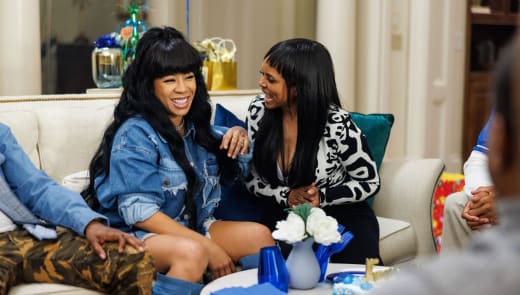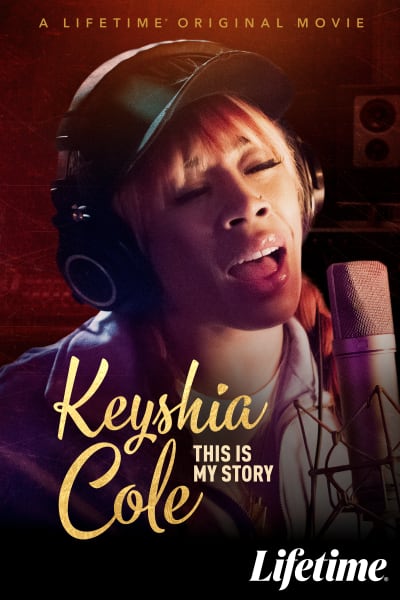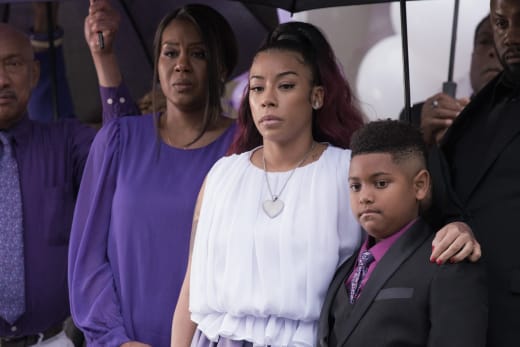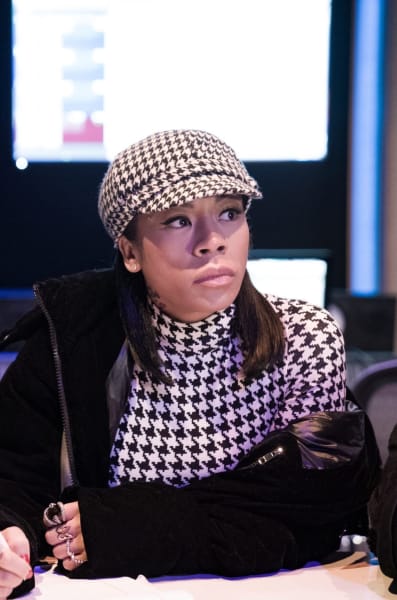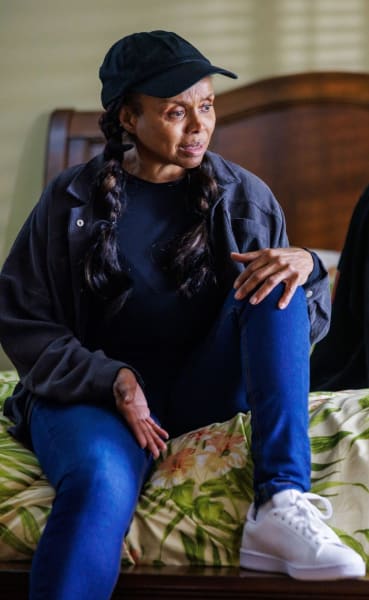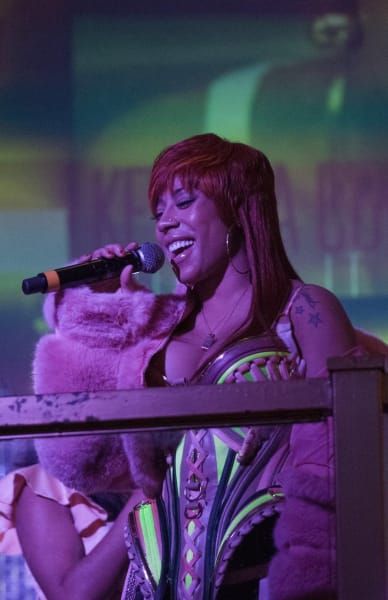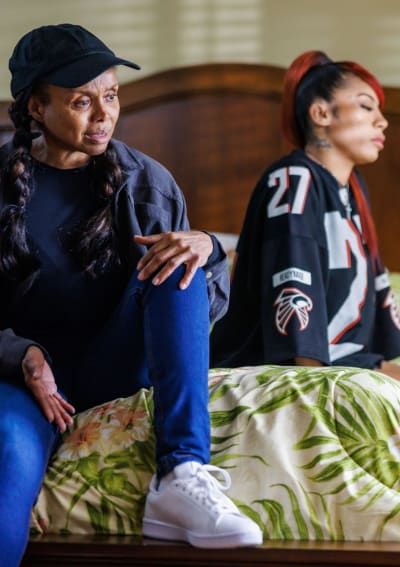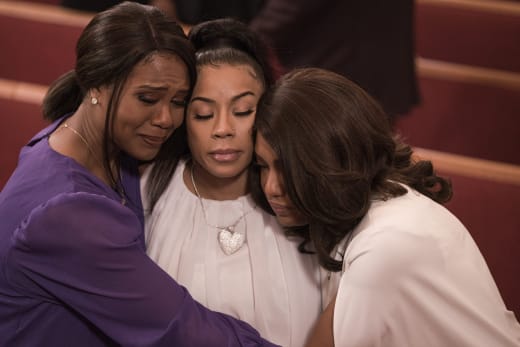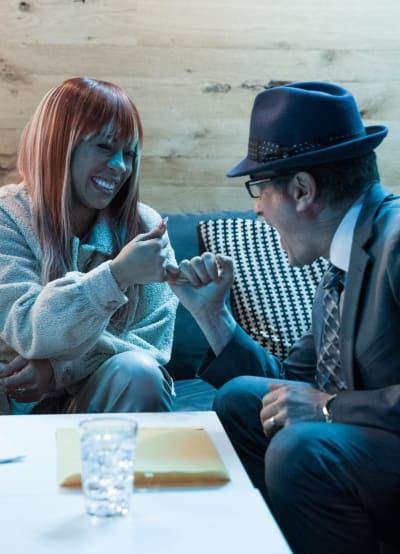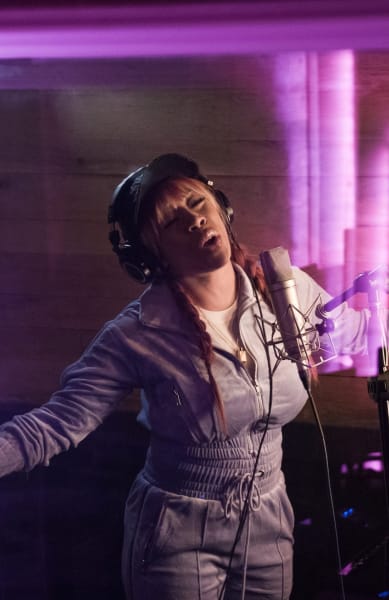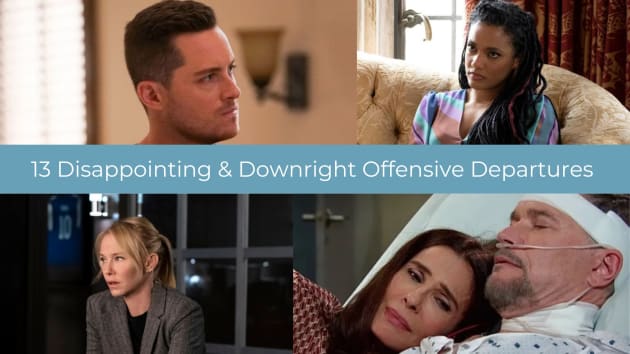
Lifetime delivers another engaging biopic.
The network has delivered more than a few of them, and Keyshia Cole: This is My Story was not only executive produced by the R&B singer, but she starred in it as well.
The film had the task of serving as both a biopic of Keyshia’s life, specifically capturing her ascent to fame, while also serving as a tribute to her late mother, Frankie.
It was a fitting biopic to follow the Mary J. Blige double feature of Real Love and Strength of a Woman. The timing of all three couldn’t be better falling within Black Music History month. And both women did a strong job with their first projects they executive produced for the network.
In many ways, the pacing of the film was frenetic, sailing through her adolescence so quickly it barely covered ten minutes of the film and jumping all over the place in its attempts to capture critical highs and lows of Keyshia’s life as she paid her dues, got discovered, and became a massive success.
Because of how often it jumped about, it was difficult for some moments to truly breathe. If you weren’t following along with the everchanging years listed in the corner because you blinked or kept up with our girl’s wig game, you’d lose track of the timeline altogether.
In many ways, I wish they had stuck to one set time period, spent a bit more time in it, and slowly eased their way into the present.
As a result, the goal of telling Keyshia’s life story while also focusing on exploring her challenging relationship with her mother often felt like they were in direct opposition, vying for our attention.
Those who are even casual fans of the singer were likely familiar with the reality series that focused on her and her family’s life.
Following them around gave people a deeper insight into Keyshia and all the things she’s overcome, her love for her family, her passion, and so much more.
If you followed along with any of that, much of this film felt redundant, giving us a dramatized variation of what we could piece together from her songs and Keyshia Cole reality series.
And that’s why the film was at its best when it centered on the complexities of Keyshia’s relationship with her mother.
I almost wish we stuck with that exclusively instead of veering into the almost run-of-the-mill exploration of Keyshia’s ascent to fame.
There was so much richness, rawness, and beauty in the moments we got between Keyshia and her mother. It was the story that one gravitated to the most as it touched on so many things.
It was the opportunity to explore generational trauma and Keyshia’s efforts to break cycles in her family. When the movie focused on that, it was impossible not to be locked in completely, and for her acting debut, Cole did a great job.
Our Kind of People‘s Debbi Morgan, though, has always been a force, a legend who deserves every last bit of her flowers right here and now. To say she stole this film would be the understatement of the century.
She was magnificent. She did such a remarkable job playing Frankie; there were moments it literally gave me chills. It’s almost eerie how well Morgan embodied the late mother and grandmother.
Morgan put forward such effort and intention when capturing this woman from her mannerisms, the inflection in her voice as she said signature phrases and her body language.
And Frankie was a complex woman. She was funny, charismatic, quirky, vivacious, and very evidently a woman who truly did care and love her kids, even if she didn’t always know how to show it in a way that registered.
Keyshia Cole’s story isn’t her story without this woman, and that much is clear. Yet I almost craved a story that focused more exclusively on Frankie.
That woman has one hell of a story. She experienced a lot in her life; it likely would’ve been a more compelling watch if she were at the center of it.
One doesn’t endure some of the hardships she faced without having a hell of a story or testimony to share. By the film’s end, a sense of sadness hit that we would never really know how Frankie became the complicated woman she was.
One doesn’t have that intense of a battle with addiction, tragically losing that fight altogether, without something deeper at the root of it.
And as much as Frankie was so full of life, outspoken, and someone who made her presence known, you also sensed that she harbored many secrets and was private and guarded with parts of her life.
Keyshia’s relationship with Frankie perfectly encapsulates individuals’ struggles when their loved ones are addicts.
Addiction is an awful disease that doesn’t solely affect the person battling it but everyone around them.
One’s heart ached for Keyshia and her sisters regarding how they each reacted and responded to their mother’s addiction. And you couldn’t blame them for their moments of falling out with this woman and removing her from their lives.
Neffe, especially, was the most vocal about her conflict with her mother. It seemed she openly harbored the most pain as one of the oldest who didn’t land in a loving home with a nice family like Keyshia and her other sister and someone who experienced the very worst of Frankie letting her down.
She, too, had a compelling angle in this film that I wished got explored more as we unpacked more of the family dynamic amongst these strong, multifaceted women.
The film was at its strongest when we got those moments that featured the women, and we got glimpses of how they each contributed to trying to maintain or piece back together their broken family.
And Keyshia was at the center of that; her driving force for success, taking her from the streets where even hustlers acknowledged and respected her greatness and fame potential, was in lifting as much of her family as she could with her.
It’s both noble and reveals her vulnerability and a deep longing for this idealistic family, not just breaking the cycle but repairing it or starting a stronger, newer, healthier one.
It stayed at the forefront of her mind, through her massive success, from when she met Ron to over a decade into her career as she continued churning out music that hit the mark and the charts.
It was also there through her relationships, whether it was enduring the rocky marriage with Daniel Gibson, one that seemingly unraveled because of his infidelity and her inability actually to prioritize their family ahead of her own, or her relationship with the young Niko who didn’t seem ready or mature enough for a life together.
The biopic worked to reveal this woman who cherishes her passion for music and the authenticity that comes with expressing herself so creatively with the daughter, mother, and sister who fiercely values her family along with her faith, regardless of how messy it is.
It was hard not to be drawn by her moments and relationships with the women in her life, which suits Lifetime‘s fare as they expertly navigate capturing real women, including the bonds they share with one another.
The story of Keyshia as a daughter, navigating these messy, raw, heartwarming, heartbreaking, and contrasting relationships with both her biological mother and her adoptive one — it’s such a strong but far too subtle, in this case, angle explored.
But as the film progressed, it was touching to see those moments when Keyshia stopped thinking of her mother only exclusively through the lens of the addict who let her down or abandoned her.
Instead, it got to cling to those beautiful moments where they connected through the bond of mutual, unconditional love and motherhood.
It felt very reminiscent of a Mary Shannon quote from In Plain Sight, when she, who also had a turbulent but fascinating, loving relationship with a complicated mother, summed up how things are when one removes the naivete and even baggage of their childhood and view their parents with the fresh eyes of a seasoned adult.
She remarked:
One of the most difficult moments in anyone’s life is when the fog of childhood lifts and we see for the first time our parents as people.
Mary
Keyshia had those moments with Frankie, which were special, meaning there was an odd sense of peace during those moments at Frankie’s funeral.
She did do right by her mother, and there’s, in some twisted, grim way, that moment when one can let out a sigh of relief that their loved one who lived such a troubled life could finally rest in peace.
It’s not an unfamiliar feeling for loved ones of addicts who spend most of their lives fearing yet expecting that phone call exactly as she got from Neffe about Frankie.
Indeed, there were aspects of this film that resonated with viewers, that strong sense of family, the rags to riches story that feels as American as apple pie, the realness of it, the strong sense of faith, and just this moving tale of this famous singer who was vulnerable enough to share her story.
And for Keyshia Cole fans, there were the perks of her music and singing featured so heavily and the artist making her acting debut in this piece, too.
So, over to you, Lifetime Fanatics? What did you think of this film? Hit the comments below!
Jasmine Blu is a senior staff writer for TV Fanatic. She is an insomniac who spends late nights and early mornings binge-watching way too many shows and binge-drinking way too much tea. Her eclectic taste makes her an unpredictable viewer with an appreciation for complex characters, diverse representation, dynamic duos, compelling stories, and guilty pleasures. You’ll definitely find her obsessively live-tweeting, waxing poetic, and chatting up fellow Fanatics and readers. Follow her on Twitter.


